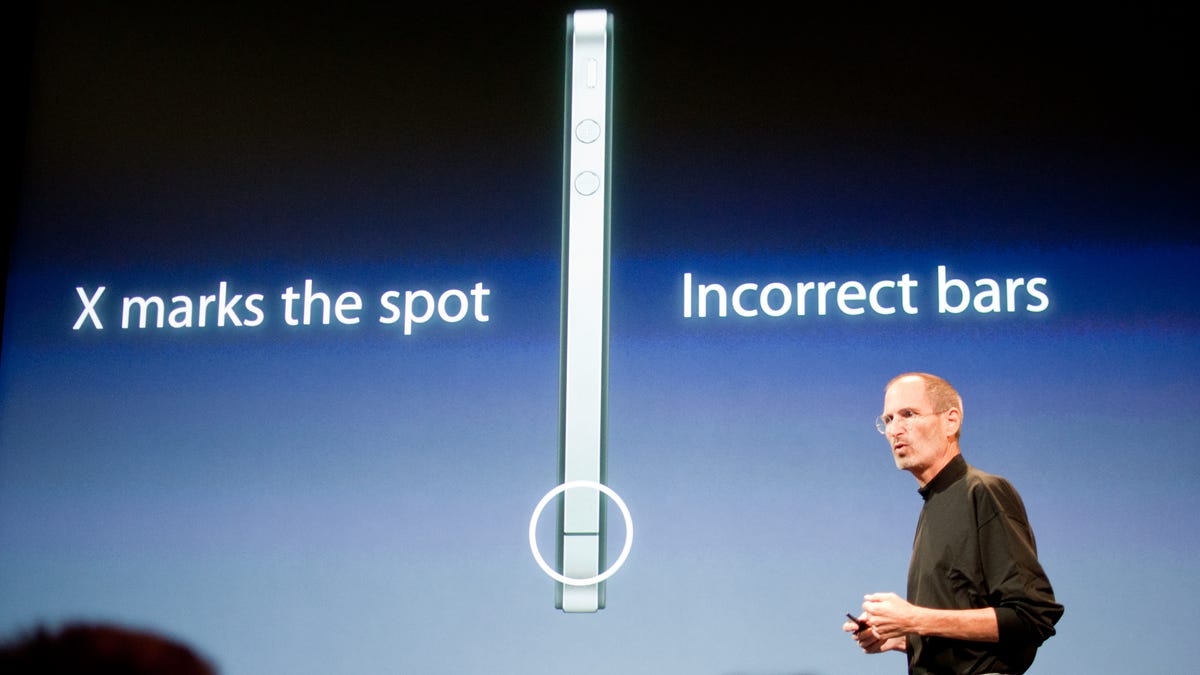Steve Jobs grits teeth, solves the iPhone 4 'crisis'
Apple CEO Steve Jobs was clearly not happy about having to address the iPhone 4's antenna, but giving away free cases will make the headache go away.

Apple CEO Steve Jobs likely quieted the outrage over the antenna issues surrounding the iPhone 4, but he sure didn't have fun doing it.
A clearly annoyed Jobs took the stage at Apple's headquarters in Cupertino Friday to announce that all iPhone 4 users would be receiving a free case to solve reception issues caused by the phone's exterior-antenna design. Apple's first response to the outcry was to change the way it displayed signal strength on the iPhone to give users more confidence in the accuracy of the signal, but Jobs acknowledged Friday that AT&T data showed the iPhone 4 dropped more calls--albeit by a small margin--than the previous model, the iPhone 3GS.
The cases have been shown to greatly reduce the signal-degradation problem, and the bumper--essentially a rubber and plastic case with no back surrounding the edges of the phone--was the top-selling iPhone accessory in Apple's online store prior to Friday's press conference: Jobs said 20 percent of iPhone buyers also left the store with a bumper. Those who have already purchased the bumper will be able to get a refund, and those who haven't will be able to get either the bumper or another special case designed to solve the problems, Jobs said.
That will likely be enough to make an annoying headache go away. Jobs and Apple took flack from public-relations experts over their initial response to the issues raised by early iPhone 4 testers, but admitting the problem was real and supplying the free cases will solve the image problem without the significant expense--and damage to Apple's reputation--that a hardware recall would have entailed.
Analyst estimates varied following Jobs' announcement, but it's believed the bumpers cost Apple between $3 and $5 to make. If you assume $5 a case and that Apple will sell 36 million iPhone 4s between now and next summer--as Piper Jaffray's Gene Munster did Friday--the total cost comes out to around $180 million. Apple recorded $5.7 billion in net income during its 2009 fiscal year, and that number is expected to grow during this year.
It also shows that Apple is willing to acknowledge perception issues can rule the day. Jobs spent much of Friday's press conference pointing out that all cell phones can suffer from signal problems when gripped a certain way, and tried to put some context around just how widespread the complaints were in the real world.
Yet instead of burying its head in the sand and insisting nothing was wrong, Apple took the hit in order to mollify customers. And more specifically, early adopters: mainstream consumers who were waiting for contracts to expire before taking the plunge might not ever remember the hullabaloo that filled Web sites during the slow summer months.
Not everyone will be pleased with this result, arguing that Apple shouldn't have sold them a phone with this problem in the first place, especially one locked to a network that is notorious for flaky service.
Clearly, Jobs was not pleased with this result. In an exasperated voice, he complained several times during the press conference that the issue was being blown out of proportion, and lamented that, "when companies get big, people want to tear them down. I've seen it happen to Google...and now I've seen some of those people jumping on us."
But in the end, it doesn't really matter: however begrudgingly (and some of his points are quite valid), Jobs made the right decision for Apple, its employees, its shareholders, and its customers in taking the hit and moving on.
Correction 4:30 p.m. PDT July 19: This story misstated the source of dropped-call data cited by Steve Jobs in his presentation Friday. The data came from AT&T.